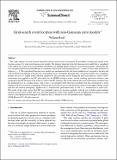Grid-search event location with non-Gaussian error models
Author(s)
Rodi, William L.
DownloadRodi-2006-Grid-search event location with non-Gaussian error models.pdf (697.7Kb)
MIT_AMENDMENT
MIT Amendment
Article is made available in accordance with the publisher's policy and may be subject to US copyright law. Please refer to the publisher's site for terms of use.
Terms of use
Metadata
Show full item recordAbstract
This study employs an event location algorithm based on grid search to investigate the possibility of improving seismic event location accuracy by using non-Gaussian error models. The primary departure from the Gaussian error model that is considered is the explicit use of non-Gaussian probability distributions in defining optimal estimates of location parameters. Specifically, the class of generalized Gaussian distributions is considered, which leads to the minimization of L[subscript p] norms of arrival time residuals for arbitrary p≥1. The generalized Gaussian error models are implemented both with fixed standard errors assigned to the data and with an iterative reweighting of the data on a station/phase basis. An implicit departure from a Gaussian model is also considered, namely, the use of a simple outlier rejection criterion for disassociating arrivals during the grid-search process. These various mechanisms were applied to the ISC phase picks for the IWREF reference events, and the resulting grid-search solutions were compared to the GT locations of the events as well as the ISC solutions. The results indicate that event mislocations resulting from the minimization of L[subscript p] residual norms, with p near 1, are generally better than those resulting from the conventional L[subscript 2] norm minimization (Gaussian error assumption). However, this result did not always hold for mislocations in event depth. Further, outlier rejection and iterative reweighting, applied with L[subscript 2] minimization, performed nearly as well as L[subscript 1] minimization in some cases. The results of this study suggest that ISC can potentially improve its location capability with the use of global search methods and non-Gaussian error models. However, given the limitations of this study, further research, including the investigation of other statistical and optimization techniques not addressed here, is needed to assess this potential more completely.
Date issued
2006-06Department
Massachusetts Institute of Technology. Department of Earth, Atmospheric, and Planetary SciencesJournal
Physics of the Earth and Planetary Interiors
Publisher
Elsevier
Citation
Rodi, William. “Grid-search Event Location with non-Gaussian Error Models.” Physics of the Earth and Planetary Interiors 158.1 (2006): 55–66. Web. 20 Apr. 2012. © 2012 Elsevier B.V.
Version: Final published version
ISSN
0031-9201
0031-9201